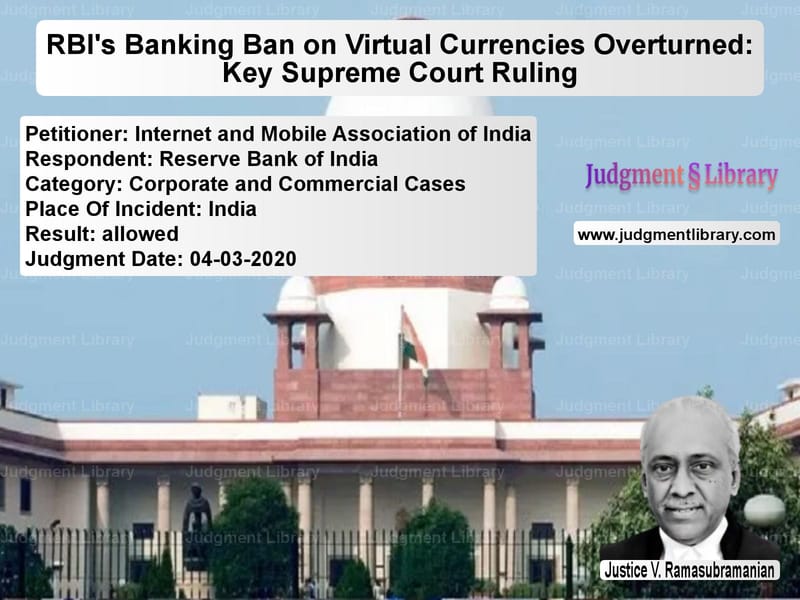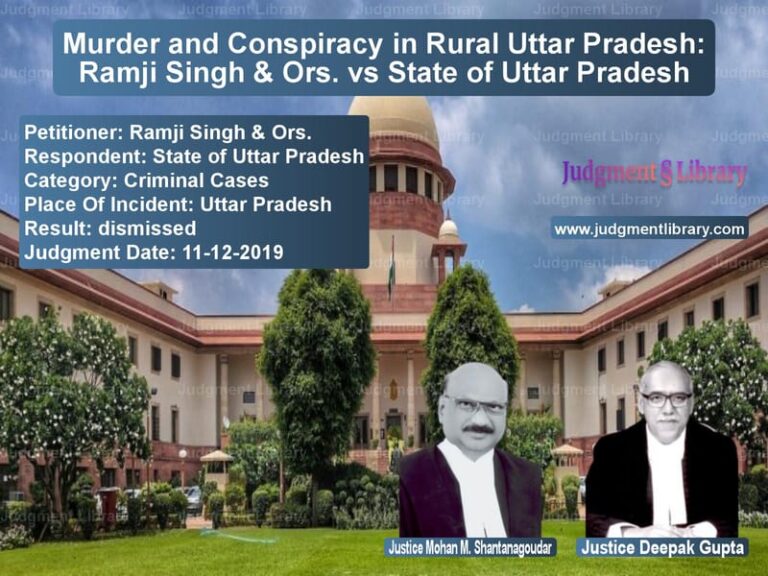RBI’s Banking Ban on Virtual Currencies Overturned: Key Supreme Court Ruling
The Reserve Bank of India (RBI) issued a circular on April 6, 2018, prohibiting all banks and financial institutions under its regulation from providing services to individuals and businesses involved in virtual currency (VC) transactions. This directive, effectively banning cryptocurrency trading, significantly disrupted the digital asset ecosystem in India, leading to legal challenges from affected stakeholders. The Internet and Mobile Association of India (IAMAI), along with several cryptocurrency exchanges and traders, challenged the validity of this circular before the Supreme Court, arguing that it was unconstitutional, arbitrary, and beyond the regulatory scope of the RBI.
The key legal questions before the Supreme Court were:
- Does the RBI have the statutory authority to prohibit financial institutions from dealing with virtual currencies?
- Did the circular violate the fundamental right to trade under Article 19(1)(g) of the Indian Constitution?
- Was the RBI’s action reasonable and proportionate in light of the risks associated with virtual currencies?
- Should the government, rather than the RBI, have the authority to regulate cryptocurrency transactions?
Arguments by the Petitioners
The petitioners, led by IAMAI, contended that:
- Virtual currencies do not constitute legal tender but are merely tradable digital assets. Therefore, RBI lacks jurisdiction over them.
- The RBI’s directive was excessive and lacked empirical evidence of harm caused by cryptocurrency transactions to the financial system.
- By restricting banking access, the circular effectively imposed a complete ban on cryptocurrency trading, violating Article 19(1)(g), which guarantees the right to practice any profession or carry on any occupation, trade, or business.
- No legislative framework explicitly outlawed cryptocurrency transactions, and any such prohibition should come from Parliament, not the RBI.
- Several other countries, including the US, UK, Japan, and European Union nations, had opted for regulatory frameworks rather than outright bans on digital currencies.
Arguments by the Respondent (RBI)
The RBI defended its action, asserting that:
- Virtual currencies posed significant risks, including money laundering, terrorist financing, and consumer fraud.
- The financial instability caused by speculative cryptocurrency trading could undermine the monetary system.
- The circular was not an outright ban but merely a precautionary measure to prevent regulated financial entities from exposing themselves to the risks associated with virtual currencies.
- The RBI, as India’s primary financial regulator, had the authority to take preventive steps in the interest of banking integrity.
Supreme Court’s Observations
After an exhaustive review of the arguments, the Supreme Court delivered its landmark judgment, analyzing the proportionality of the RBI’s action. The Court noted that while the RBI had statutory authority to regulate financial institutions, its decision had disproportionately affected legitimate businesses engaged in cryptocurrency trading. The Court made the following observations:
- While the RBI can regulate virtual currency transactions involving banks, it cannot impose a complete prohibition without demonstrating specific and tangible harm caused by such transactions.
- The RBI circular effectively shut down a legitimate business activity without adequate justification, violating Article 19(1)(g) of the Constitution.
- The government, rather than the RBI, should introduce a proper legal framework to address the risks and benefits of virtual currencies.
Final Judgment
The Supreme Court ruled in favor of the petitioners and set aside the RBI’s circular, allowing banks to resume services for cryptocurrency transactions. The key takeaways from the ruling were:
- RBI’s circular was ultra vires (beyond its powers) and unconstitutional due to its disproportionate impact on businesses.
- The government should enact legislation to regulate virtual currencies instead of imposing ad hoc restrictions.
- The RBI cannot restrict banking services for a lawful business without demonstrating direct financial risks.
Conclusion
The judgment has far-reaching implications for cryptocurrency regulations in India. It reaffirms the importance of proportionality in regulatory actions and underscores that financial regulators must base their decisions on substantial evidence rather than speculative risks. The ruling paves the way for a structured regulatory framework for virtual currencies, balancing innovation with financial security.
This judgment serves as a reminder that while regulators have broad powers, they must exercise them within constitutional limits. It also highlights the growing need for clear and well-defined cryptocurrency regulations in India.
Petitioner Name: Internet and Mobile Association of India.Respondent Name: Reserve Bank of India.Judgment By: Justice V. Ramasubramanian.Place Of Incident: India.Judgment Date: 04-03-2020.
Don’t miss out on the full details! Download the complete judgment in PDF format below and gain valuable insights instantly!
Download Judgment: Internet and Mobile vs Reserve Bank of Indi Supreme Court of India Judgment Dated 04-03-2020.pdf
Direct Downlaod Judgment: Direct downlaod this Judgment
See all petitions in Company Law
See all petitions in Corporate Compliance
See all petitions in unfair trade practices
See all petitions in Judgment by V. Ramasubramanian
See all petitions in allowed
See all petitions in supreme court of India judgments March 2020
See all petitions in 2020 judgments
See all posts in Corporate and Commercial Cases Category
See all allowed petitions in Corporate and Commercial Cases Category
See all Dismissed petitions in Corporate and Commercial Cases Category
See all partially allowed petitions in Corporate and Commercial Cases Category







